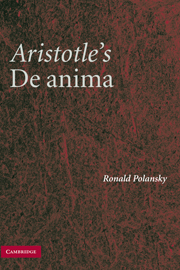Book contents
- Frontmatter
- Contents
- Preface
- List of Abbreviations
- Introduction
- COMMENTARY ON DE ANIMA: : Book 1
- COMMENTARY ON DE ANIMA: Book 2
- COMMENTARY ON DE ANIMA: Book 3
- 1 In the World As It Is There Can Be but the Five Senses
- 2 What Allows for Perceiving That We Perceive; Sense Joins in a Common Power so That the Five Senses Are Subfaculties of a Central Sense Faculty
- 3 Distinguishing Sense and Thought; What Is Phantasia?
- 4 What Is Mind as That Capable of Thinking All Things
- 5 What Enables Thinking to Occur
- 6 The Sorts of Intelligible Objects
- 7 Phantasia Has a Role in All Thinking
- 8 That Mind Can Think All Things
- 9 There Is a Capacity for Progressive Motion
- 10 The Desiderative Capacity Is the Primary Cause of Progressive Motion
- 11 Even the Simplest Animals Have Indefinite Phantasia, and Calculative Phantasia Fits the Account of Progressive Motion
- 12 The Necessary Order of the Faculties of Soul
- 13 The Sort of Body Requisite to Support the Order of the Faculties of Soul
- Bibliography
- Index
9 - There Is a Capacity for Progressive Motion
Published online by Cambridge University Press: 18 December 2009
- Frontmatter
- Contents
- Preface
- List of Abbreviations
- Introduction
- COMMENTARY ON DE ANIMA: : Book 1
- COMMENTARY ON DE ANIMA: Book 2
- COMMENTARY ON DE ANIMA: Book 3
- 1 In the World As It Is There Can Be but the Five Senses
- 2 What Allows for Perceiving That We Perceive; Sense Joins in a Common Power so That the Five Senses Are Subfaculties of a Central Sense Faculty
- 3 Distinguishing Sense and Thought; What Is Phantasia?
- 4 What Is Mind as That Capable of Thinking All Things
- 5 What Enables Thinking to Occur
- 6 The Sorts of Intelligible Objects
- 7 Phantasia Has a Role in All Thinking
- 8 That Mind Can Think All Things
- 9 There Is a Capacity for Progressive Motion
- 10 The Desiderative Capacity Is the Primary Cause of Progressive Motion
- 11 Even the Simplest Animals Have Indefinite Phantasia, and Calculative Phantasia Fits the Account of Progressive Motion
- 12 The Necessary Order of the Faculties of Soul
- 13 The Sort of Body Requisite to Support the Order of the Faculties of Soul
- Bibliography
- Index
Summary
Aristotle might have spoken of the faculty of soul that moves an animal in respect to its location after he dealt with sense perception, and in ii 3 it was seen that progressive motion extends to more animals than does intellection (consider the order of powers of soul in 414a31–32). But presumably since humans also have thought entering into their desire and locomotion, he has treated all the cognitive capacities before taking up those that cause voluntary motion. It would be clumsy to deal early with the voluntary motion of animals only to have to return to human voluntary motion later after the treatment of mind. And to treat phantasia first would also seem important, if this is central to the life of many animals (415a11) and even human practical thinking depends upon it (431a14–17, b6–10). Phantasia, it may be recalled, only became a topic in iii 3 in the midst of distinguishing thought from sense. Hence, the position in the text of this inquiry into capacity for progressive motion seems appropriate. Treatment of the cognitive capacities of ensouled beings is thus surrounded by inquiry into capacities for motion, that is, the nutritive capacity and the faculty for progressive motion. Moreover, this locomotive faculty may straddle faculties already considered more than is the case with the others considered. This allows Aristotle to raise some issues that lead well into the concluding chapters of the book.
- Type
- Chapter
- Information
- Aristotle's De AnimaA Critical Commentary, pp. 501 - 513Publisher: Cambridge University PressPrint publication year: 2007



